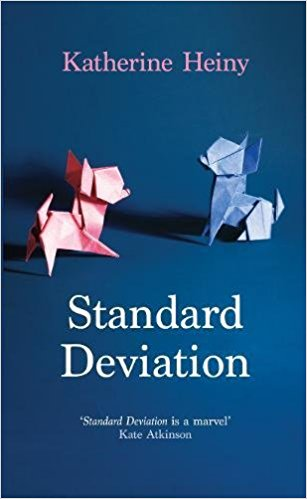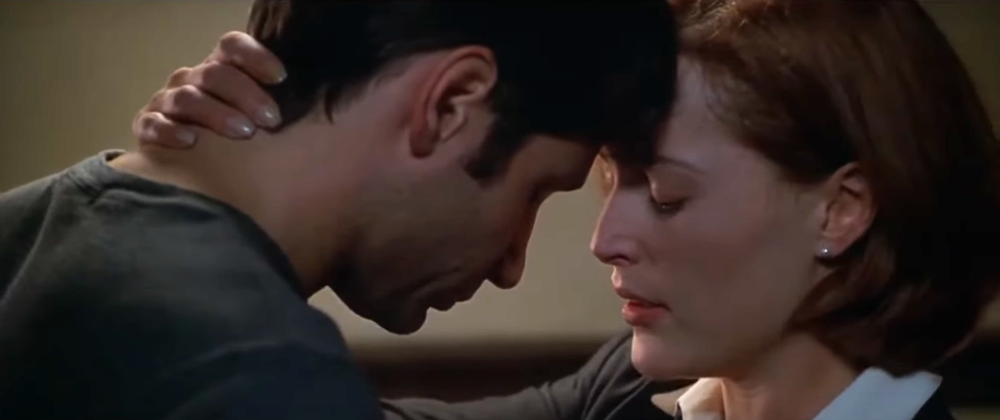interviews
The Power and Purpose of Gossip
Katherine Heiny on the busybodies and rumor-mongers who connect us all, plus the age-old question, can exes be friends?

When I spoke on the phone with Katherine Heiny about her novel Standard Deviation, it felt like I was chatting with an old friend rather than a stranger whose book I’d just read. We had plenty to talk about from the novel, but that frequently diverged into relating social anecdotes and musing on the nature of relationships with friends, exes, and everyone in between.

It was totally fitting, given the book we were discussing — Standard Deviation is at it’s core a novel about the underlying maps of information that swirl below our social lives and relationships. How we build bonds, how we tell stories about ourselves and others, and the tropes of human interaction that occur again and again as we grow older and build a life.
When Graham runs into his ex-wife Elspeth at the sandwich counter, they haven’t spoken in ten years. Graham’s second wife Audra is the opposite of Elspeth in every way — Elspeth is stoic, poised, and regal to Audra’s effusive, vivacious social butterfly. As Graham tries to form a tentative friendship with Elspeth, he discovers the negative side of being married to the socially successful Audra. The book follows Graham’s attempt to make sense of Audra’s ever expanding social universe while navigating a tenuous bond with his ex, along with a seemingly endless parade of social follies with the novel’s numerous minor characters.
Heiny and I talked about turning funny stories into fiction, the positive side of gossip, and our mutual love for Mary Higgins Clark.
Rebecca Schuh: Early in the book, there’s a passage where Graham, the narrator, talks about how he knows so many facts about the life of his wife’s best friend from hearing that information relayed through Audra, his wife. It made me think about the secondary relationships you have, say you’re friends with your partner’s friends, or you’re friends with your sister’s best friend, and it’s this complex stream of personal facts. What inspired you to include those tributaries of social information in the novel?
Katherine Heiny: Audra is so well connected, and she knows so much about other people, but it’s not a one-way street with her by any means — she also gives out a lot of information. I have these two really close friends who are sisters, and when my husband and I were first dating he was said, “I love the way that you tell me what happened and then you tell me what they thought of it. That’s part of the story for you.” I continue to do that — it had never occurred to me to do it any other way. I think that when you’re really close friends with someone, they’re in your head all the time.
RS: Absolutely, I found it comforting to think that there are all these people out there who kind of know you even though you don’t know them. I guess that’s how groups of friends form.
KH: When I was writing the novel, a friend of mine, one of the sisters, was staying with us before going to a wedding, and I asked about who the groom, a mutual friend, was marrying, and she said “I know nothing about the bride except she gets really wet during sex.”
RS: Ha!
KH: I said, “I’m going to use that in a book that’s so great,” but I not only liked it because it was funny, but because now she’s going to meet this woman and that’s going to be in her head forever! That’s a big theme of the novel, all this information swirling under the surface.
RS: When Graham and his ex-wife Elspeth reunite at the sandwich counter, they haven’t spoken in ten years. I was so fascinated by that, it’s crazy to think that you could be married to someone, speak to them every hour of the day, and then not speak to them for ten years. How did you capture that feeling of seeing someone who used to be such a large part of your life and now is excommunicated to a certain degree?

KH: I guess it sort of plays into what we were talking about how when you’re close to someone, they’re in your head all the time, and then suddenly, they’re not. And it’s not just marriage, it’s a relationship or a friendship. I think that meeting someone who used to be really important to you but no longer is — that’s a really discombobulating experience. You really have no idea how to get through it. And I think that when Graham goes home and Audra says “You didn’t get the answers to any of the good questions!” I think I would be more like Graham in that way, “Let’s just survive this, let’s not have there be any more hurt feelings.”
RS: Was it different for you to write from a male perspective?
KH: It wasn’t — the character of Graham and I have so much in common, and the way we see the world, that it wasn’t really hard. Audra was so forceful, there’s something very feminine about her, a feminine quality of socializing, and how she’s always creating this social microcosm wherever she goes, and she puts so much of herself into her dialogue and tells so many stories that I already felt there was a female perspective in the book. I never felt like that was missing.
RS: Because she’s kind of infiltrating everything, even the things that aren’t about her. Graham’s narration is just so funny, and humor is a quality that transcends the male or female perspective. I loved how it was so conversational. Did you get that humor from how your friends talk? How you talk? What was the root?
KH: I think a lot of things that Graham says are funny just because they’re true, but not a lot of people say them. Anything you say that’s true ends up being funny. There’s a line where they have dinner with a couple who only eats meat and potatoes, and Graham thinks, “Could you marry someone like that, could you marry someone knowing you’d never have pizza.” That would be the first thing that would pop into my head, a totally selfish thing.
RS: Audra loves to gossip, and it took on a greater significance because gossip gets this really bad rap in society, but when she’s using the gossip to include the priest, Graham says, “to draw him to her like a warm silk net, for this evening anyway, felt like friendship,” and I thought, wow there are times when gossip can be positive. What’s your take on gossip?
KH: I think on some level it’s the basis of conversation, otherwise it all diminishes down into how’s the weather and where did your kid go to school. I couldn’t live with the alternative of constantly boring conversation. So I think that startlingly, I’m pro gossip. What a horrible thing to sort of realize about myself. I think saying negative things is really a basic human need.
“I think that startlingly, I’m pro gossip. What a horrible thing to sort of realize about myself. I think saying negative things is really a basic human need.”
RS: A big part of the book is the tentative friendship that Graham and Elspeth try to rebuild, and it brought up the age old question, do you think it’s possible to be friends with your exes?
KH: I do, but I think that it depends on the relationship. I think some relationships, the damage has been done, and there’s no going back. And I think that Graham doesn’t want to admit that, and he definitely doesn’t want to admit that he was the one who struck the fatal blow to the marriage. I think that he feels if he could show his first wife that things were meant to be with Audra, and they’re perfect for each other, it will somehow make everything alright. And it really doesn’t. But I guess the question, one of the questions I was considering when I was writing the novel, was about exes: are they friends, or are they just people who know you really well? Or something else? They seem to exist in this weird category all by themselves. I wanted to write about it because it was unusual, because so many people have no relationship with people who used to be everything to them. That seems really strange to me. I’m not best friends with all my exes, but I’m in touch with all of them.
My dad, when my brothers and I were old enough to have serious relationships, he’d say a year after we broke up with someone “Now how’s Victor?” And we were always like “Dad, we don’t know, we broke up!” but now I think that maybe my dad was seeing that from a more mature standpoint, thinking that person must still be around.
RS: One thing I found fascinating about Graham is that he is so wounded emotionally when Audra is unfaithful, even though his cheating on Elspeth with Audra was the start of their marriage. It made me wonder, is there some kind of cognitive dissonance that still lets us get really emotionally hurt about actions that we’ve also perpetrated?
KH: Oh yeah, I think so. There’s the point in the novel where they discover that probably the origami teacher has been unfaithful at the origami convention, and Audra’s very critical of that, and Graham thinks, “oh I wish that I could take comfort in the fact that she doesn’t like that, I wish that meant that she would never do that,” but it’s all different when it’s you. People are so innately selfish that, it’s cognitive dissonance, or a double standard, or however you want to say it. I think some people have trouble with change, and they’re like, “she was faithful to me when we met so she’s going to be faithful now.” They apply these standards across decades when the person might not be who you know anymore.
RS: There’s a quote in the book, “All people believe that there are two kinds of breakups, the kind that apply to other people and the kind that apply to them, but in reality there’s just one.” I found that interesting, there’s so many ways that could be interpreted, especially within the context of the book, because it involves so much infidelity. Could you extrapolate a bit on what you meant by just the one kind of breakup?
KH: I think there is just one kind of break up, which is where the person you’re in a relationship with doesn’t want to be with you anymore. And I think that people will go to all kinds of (and by people I mean me) lengths to say that it’s not really that. It’s really that the person is in love with me but couldn’t deal with it or didn’t realize it or it wasn’t the right time. The lengths that people go to to get back together with someone in what they hope is a random way, and the idea that you can argue a person back to being in love with you, I find really preposterous but really common. You’re hoping your lover is going to call you up and be like hey, “I’ve been rethinking that, and you made some really good points, we should get back together!”
RS: Right, like your email really convinced me! How have you transitioned away from writing the book?
KH: Last month I flew to Michigan, and I sat next to this man and he was like shifting all around and I gave him a sort of annoyed look, and he said I’m sorry but the legs of my underpants are too tight! And I was like, “Well, is my life over? Is this the best, funniest thing that’s ever going to happen to me? Everything that will happen from here on out is a disappointment!” but I also thought, I can’t believe the book is done and I don’t’ get to put this in there!
I had never written a novel before, and I was very intimidated by the idea, and then it wound up being so rewarding and so much fun, even though it was hard work. So I’m excited for it to be out in the world but I’m also sort of sorry that it’s not mine to wake up to every day anymore.
RS: How did you find it different from writing short stories?
KH: I wrote short stories for so long because I felt I had control over them. I thought it was a lesser commitment, and if a story doesn’t work then it doesn’t work, and you wish you had that month back — but a novel is this huge commitment, and I guess I was really afraid that I would not be able to make it work. The Lorrie Moore quote is, “The short story is a love affair and a novel is a marriage.” And I think a short story is like a party, and a novel is like this really long family reunion where you have to see everybody in their bathrobe in the morning whether you want to or not. And I started writing it as stories, and I was like it’s going to be linked stories, and my agent was like ‘do you have another chapter?’ and I was like, please don’t call it a chapter, it’s a short story! So I kind of got into it by fooling myself into thinking it was linked short stories but it really became a novel.
“A short story is like a party, and a novel is like this really long family reunion where you have to see everybody in their bathrobe in the morning whether you want to or not.”
RS: How has writing changed in the time period between your early stories and the novel?
KH: Did you ever read Lois Duncan novels? She gave this interview late in her life about how it used to be really easy to get the heroine of your novel alone and in danger, and now you have to be like, “and her cell phone wouldn’t work!” It’s fascinating to me how much technology is starting to shape fiction and plots and things.
RS: That’s so true, when I was a teenager I read every Mary Higgins Clark book, and it’s interesting to think about what would have been differently. I remember if one of them was getting kidnapped, they’d always take off their ring and stuff it into the car seat. And that was how they always found out where the girl was, because she stuck her ring into a car seat, now they’d be using “find my iPhone.”
KH: I met Mary Higgins Clark last year and it was the single most exciting thing that happened ever, to anyone, oh my god.
RS: Amazing! She’s the dame of suspense!
KH: There was something so deeply satisfying about her books.
RS: When I went through my I-love-David-Foster-Wallace period in college, someone sent me a photocopy of a syllabus he had for a creative writing class that was floating around the internet, and he taught Mary Higgins Clark in one of his fiction classes.
KH: I love that. I met her at this fundraiser, and we were sitting at different tables so I didn’t meet her until the end, and I had had a couple beers, and she was trying to get into a cab, and I told her, you mean so much to me! And she was like okay dear, my cab is here! But she was very gracious, very funny, she’s amazing in so many ways in terms of the darkness in her books, she wrote at a time when women weren’t supposed to write things like that. She’s such a maverick and so talented.
RS: And her heroines were feminists! She had scientists and doctors, and the woman at the center was always a very strong character.
KH: And the woman always solves the mystery; it’s not like some man comes in and rescues her. In lots of her books, not one person knows the secret but the community, everyone knows a piece of it and lots of the people who know a piece are stay-at-home moms, or there’s this sense that women are very valuable in ways that might not be apparent. Wow, now we have to write some paper about Mary Higgins Clark. We’ll have a two person panel.








